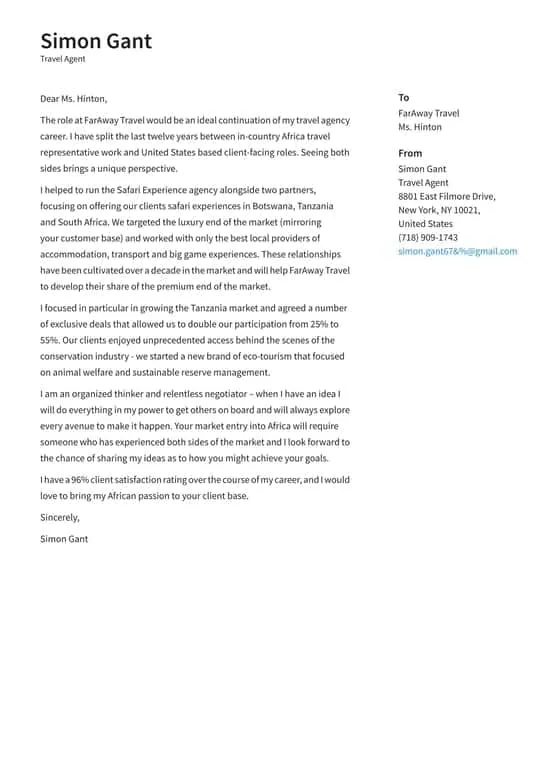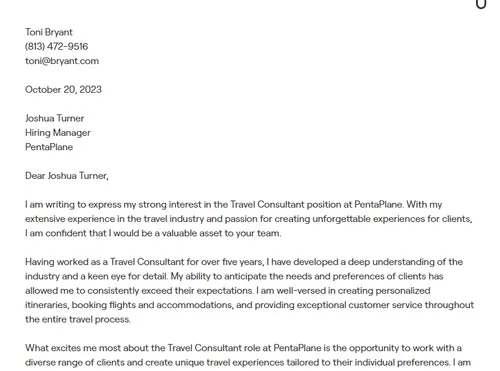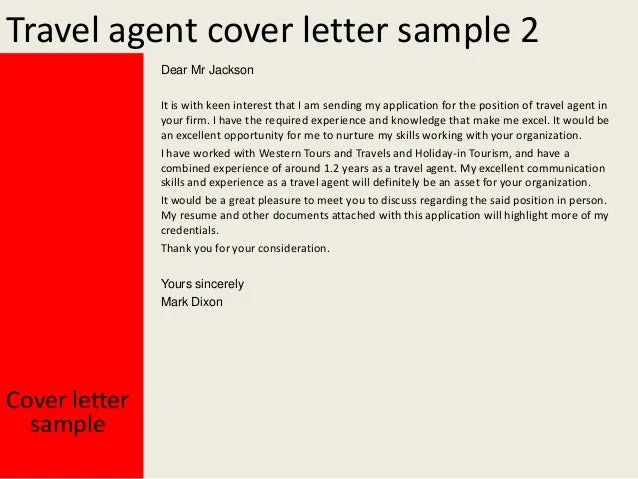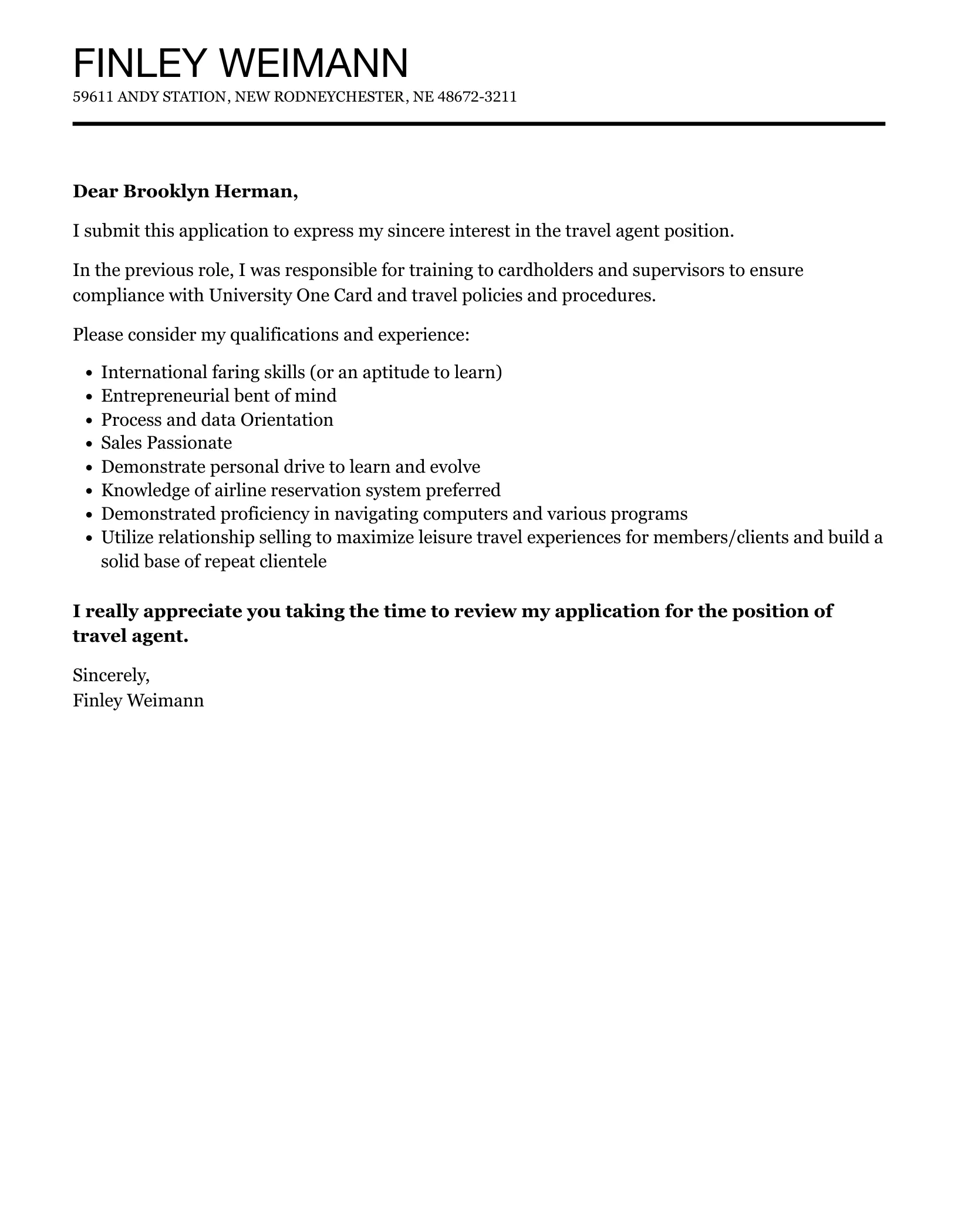Why a Stellar Cover Letter Matters
In the competitive world of travel agencies, your cover letter is your first impression. It’s the initial opportunity to showcase your personality, enthusiasm, and qualifications to potential employers. A well-crafted cover letter can make you stand out from the crowd of applicants, highlighting why you are the perfect candidate. This document goes beyond your resume, providing context and depth to your application. It’s not just a formality; it’s a chance to demonstrate your communication skills, your understanding of the travel industry, and your genuine interest in the specific role. A weak cover letter can lead to immediate rejection, regardless of your experience. However, a strong, tailored letter can significantly increase your chances of securing an interview and ultimately landing your dream job as a travel agent. Remember, the goal is to capture the hiring manager’s attention and make them want to learn more about you.
Highlighting Your Travel Agent Skills
Your cover letter should act as a spotlight, illuminating the skills and experiences that make you a valuable asset to a travel agency. Begin by identifying the key skills listed in the job description and ensuring you can address these directly. This targeted approach demonstrates that you’ve carefully reviewed the requirements and are confident in your ability to meet them. For example, if the agency emphasizes customer service, detail how you have consistently exceeded customer expectations in past roles. If the position requires knowledge of specific destinations, mention your expertise and any certifications or training you’ve acquired. Use action verbs to describe your accomplishments, such as ‘managed,’ ‘coordinated,’ ‘achieved,’ and ‘resolved.’ These verbs add impact and bring your experiences to life, making your skills more tangible and memorable. Tailoring your cover letter to each specific job application shows that you are serious about the role and have the ability to align your skills with the needs of the employer.
Experience Section

When detailing your experience, go beyond listing your previous job titles and responsibilities. Instead, focus on providing specific examples that demonstrate your achievements and the impact you had in each role. Quantify your accomplishments whenever possible, using numbers to illustrate your successes. For example, instead of saying, ‘Managed customer inquiries,’ state, ‘Managed over 50 customer inquiries daily, achieving a 95% satisfaction rate.’ Highlight any instances where you successfully resolved complex issues, exceeded sales targets, or improved customer retention rates. This kind of detail shows that you are results-oriented and can add real value to the agency. If you are new to the industry, focus on transferable skills from other fields. Highlight your communication, organizational, and problem-solving abilities. Emphasize any relevant coursework, internships, or volunteer experiences that demonstrate your commitment to the travel industry and your eagerness to learn and grow.
Tailoring Your Cover Letter for the Job
Generic cover letters are easy to spot and often end up in the rejection pile. To significantly increase your chances of success, it is essential to customize your cover letter for each specific job application. Start by carefully reading the job description and identifying the key requirements and preferred qualifications. Use this information to shape your letter, highlighting the skills and experiences that are most relevant to the role. Research the travel agency you are applying to. Understand their specialization, their values, and their target market. This understanding will allow you to demonstrate a genuine interest in the company and explain how your goals align with theirs. Mention specific travel destinations or types of travel that the agency focuses on, if applicable, and demonstrate how your knowledge and passion in those areas can contribute to their success. By showing that you’ve done your homework and understand the agency’s needs, you will prove your commitment and set yourself apart from the competition.
Key Skills to Showcase
Travel agent roles demand a unique blend of skills. Your cover letter is the perfect place to highlight these. First, excellent communication skills are paramount. You should be able to articulate complex travel plans clearly, both in writing and verbally. Demonstrate your ability to listen actively to clients, understand their needs, and tailor your recommendations accordingly. Secondly, organizational skills are critical. Travel agents must manage multiple bookings, schedules, and details simultaneously. Highlight your proficiency in time management, attention to detail, and your ability to prioritize tasks. Thirdly, a strong understanding of customer service is essential. Showcase your ability to build rapport with clients, handle complaints effectively, and provide a positive experience. If you have experience with travel booking software (e.g., Amadeus, Sabre, or similar), be sure to mention it. If you possess language skills or specialized destination knowledge, these should also be included, as they can give you a significant edge in the industry.
Communication Prowess

Effective communication is a cornerstone of a successful travel agent’s career. In your cover letter, emphasize your ability to communicate clearly, concisely, and persuasively. Provide examples of how you have successfully explained complex travel options to clients in a way that they understand. Highlight any experience with written communication, such as email correspondence, brochures, or promotional materials. Mention your ability to actively listen to clients’ needs and respond with tailored solutions. Good communication also involves being able to handle difficult conversations professionally and resolve conflicts effectively. Showcase your ability to build rapport with clients and create a positive, trusting relationship. This is crucial for client retention and referral business. Also, include examples of how you have used communication to close deals, upsell services, or manage expectations, demonstrating that you can not only convey information but also drive results.
Customer Service Excellence
In the travel industry, customer service is everything. Highlight your commitment to providing exceptional service in your cover letter. Give specific examples of how you have gone above and beyond to satisfy clients. For instance, describe how you have handled difficult situations, such as missed flights or lost luggage, and the steps you took to resolve the issues promptly and effectively. Mention any awards or recognition you have received for your customer service skills. Demonstrate your ability to build lasting relationships with clients and generate repeat business. Provide examples of how you have anticipated client needs and offered proactive solutions. Discuss your ability to remain calm and professional under pressure, providing reassurance and support to clients during stressful situations. Your goal is to show that you prioritize customer satisfaction and strive to exceed expectations consistently.
Destination Knowledge
Your knowledge of travel destinations can be a significant asset. Highlight your familiarity with different regions, countries, and cultures in your cover letter. Mention any specialized knowledge you have, such as expertise in a particular type of travel (e.g., cruises, adventure travel) or specific destinations. Describe any personal travel experiences that have broadened your understanding and appreciation of various destinations. Detail any certifications, courses, or training you have completed that have enhanced your destination knowledge. Show your ability to provide valuable insights and recommendations to clients based on your understanding of different locations. If you are multilingual, mention your language skills, as this can be a valuable asset when dealing with international clients. Provide concrete examples of how you have used your destination knowledge to plan successful trips and enhance customer experiences.
How to Quantify Your Achievements

Numbers and metrics add weight to your claims and provide concrete evidence of your accomplishments. Use data to illustrate your success in your cover letter. For instance, instead of saying ‘Increased sales,’ write ‘Increased sales by 20% in Q4 2022.’ If you have improved customer satisfaction, state the percentage increase, like ‘Improved customer satisfaction ratings by 15%.’ Mention the number of clients you have served, the value of bookings you have handled, or the reduction in customer complaints you achieved. Use these metrics to demonstrate your impact and your ability to drive results. If you don’t have direct sales figures, consider using other relevant metrics, such as the number of positive reviews, the volume of repeat business, or the number of referrals generated. Remember, the more specific and quantifiable you can be, the more credible your achievements will appear.
Metrics and Results
Focusing on metrics and results goes hand in hand with quantifying your achievements. In your cover letter, shift the focus from what you did to what you accomplished. Describe the impact of your actions. For example, instead of ‘Managed customer inquiries,’ state ‘Managed customer inquiries, resulting in a 90% resolution rate and improved customer satisfaction.’ If you implemented a new process, explain how it improved efficiency or reduced costs. If you were involved in a successful marketing campaign, provide the results, such as increased bookings, higher conversion rates, or a greater return on investment. Demonstrate how your skills and actions translated into tangible results for previous employers. Show that you are results-oriented and that you understand the importance of measurable outcomes. Use clear, concise language to describe your contributions and the positive effects they had on the business.
Formatting Your Cover Letter
Your cover letter’s appearance is just as important as its content. Proper formatting shows that you pay attention to detail and that you respect the recipient’s time. Use a professional font, such as Times New Roman, Arial, or Calibri, in a readable size (11-12 points). Ensure your cover letter is well-organized, with clear headings and sufficient white space. The layout should be easy on the eyes and make it simple for the hiring manager to find the information they need quickly. Keep your paragraphs concise, and use bullet points to highlight key skills or accomplishments. Check your letter for grammar and spelling errors. Proofread your cover letter multiple times, and consider asking a friend or family member to review it as well. It is also important to adhere to the format suggested by the job posting, if any. A clean, well-formatted cover letter sends a message of professionalism and competence and makes your application more appealing.
Choosing the Right Tone

The tone of your cover letter should be professional, enthusiastic, and tailored to the specific travel agency and job. Avoid overly casual language, slang, or jargon. Instead, use a formal, yet friendly tone. Demonstrate your passion for the travel industry and your excitement about the opportunity. Be confident in your abilities, but avoid arrogance. Use positive language and focus on your strengths and accomplishments. Research the agency’s brand and values and align your tone with their culture. If the agency has a more informal culture, it is acceptable to show some personality. However, in most cases, it is always best to remain professional. Before submitting your cover letter, read it aloud to ensure that it sounds natural and reflects your authentic voice. Make sure that your enthusiasm and passion are evident, but your writing remains polished and appropriate for a professional environment.
Proofreading and Editing for Perfection
Proofreading is a crucial step in the cover letter writing process. A single typo or grammatical error can undermine your credibility and make you appear careless. Before submitting your cover letter, thoroughly proofread it to catch any mistakes. Use a grammar and spell checker, but don’t rely on it completely. Read your cover letter aloud to identify awkward phrasing or sentences that don’t flow smoothly. Ask a friend or family member to review your letter. They may spot errors that you have missed. Pay close attention to the details, such as the company name, the hiring manager’s name, and the job title, ensuring that everything is correct. Ensure the letter is the right length; generally, a cover letter should be no more than one page. A well-proofread, error-free cover letter demonstrates your attention to detail and your commitment to quality, leaving a positive impression on the hiring manager. A polished and professional cover letter sets you apart from other candidates.
Call to Action and Next Steps
End your cover letter with a clear call to action. State that you are eager for an interview and express your enthusiasm for the opportunity. Provide your contact information clearly, including your phone number and email address. Thank the hiring manager for their time and consideration. Mention how you plan to follow up. You can say you will call the agency within a week to confirm receipt of the application and to reiterate your interest in the position. Make sure to follow up as promised; this shows your proactive approach and demonstrates your continued interest. Concluding your cover letter with a strong call to action ensures that you have left a lasting positive impression and increases your chances of moving forward in the hiring process. The goal is to make it easy for the employer to take the next step: contacting you.
